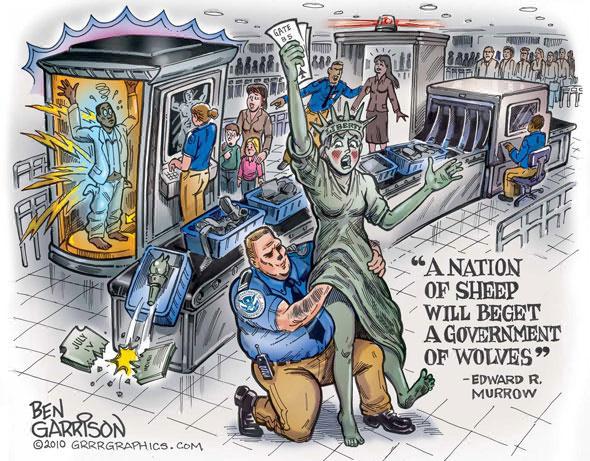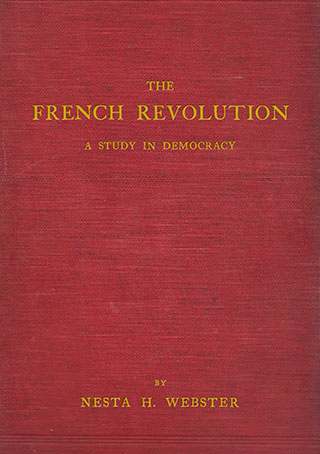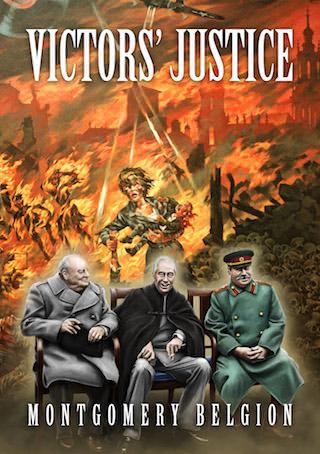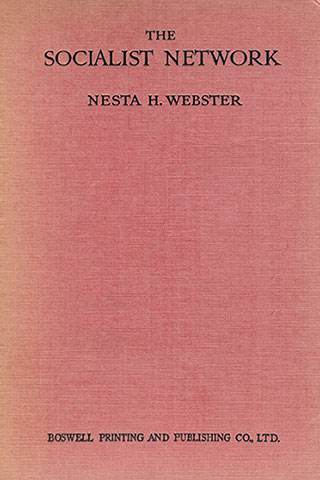Porn in the T.S.A.
When flying cross-country recently, I stood in line like everyone else for the TSA “security” check and thought about Judge Andrew Napolitano’s recent book, A Nation of Sheep. How did Americans, once known for their independence and fierce devotion to their rights, become people who easily are herded, abused, and subjected to regular state-run humiliations?

Perhaps the larger question I should have asked was this: How did a people in a society once identified by its rule of law become a people who now willingly subject themselves to what essentially is a rule of rules? The answer to me has become increasingly obvious: the USA, once known for its swashbuckling entrepreneurs, now has become a nation of bureaucrats, or, to be specific, a nation of people who think like bureaucrats.
As for people dutifully standing in line at the airport, waiting either for what some have called the “porno scanners” or to receive a “pat down” that legally can be defined as sexual assault, the answer is simple. They want to get on the plane, and they know that for passengers that resist or refuse to show deference to the TSA agents barking out orders, the consequences for them could be serious, the worst being arrested and charged with “interfering with the duties of a federal officer,” which carries a maximum penalty of 20 years in federal prison. At the very least, they will miss their plane, which will throw all sorts of havoc into their travel plans, costing them dearly.
Like the others shuffling through security, I just wanted to make my flight, and the distance to my destination ruled out driving. Any individual challenge to the abusive state of affairs I might have wanted to pursue would have ended badly for me. Of that I am sure. On one side, federal agents would have been permitted to kill me had they imagined I posed a threat, and on the other side, I would have had to pay for my acts of resistance with my own financial and personal resources.
The creation of this situation has come not only about because government officials no longer feel any sense of personal restraint upon their conduct but also because Americans themselves have become accustomed and even comfortable to living within a structure of ever-stifling rules that can trip them up no matter how hard they try to obey them. What people in this country once would have deemed oppressive has become the New Normal.
Roots of Our Non-Resistance
In his 1982 book, An American in Leningrad, attorney Logan Robinson noted that people in the former Soviet Union could do almost nothing without state interference. Their lives were forever tied up with standing in line for bad food, poor consumer products, and getting documents from the vast Soviet bureaucracy that would give them permission to do whatever. Resistance was futile for them; Robinson noted that even though he stood up against bureaucrats and argued with them, that option was not open for average Russians who did not carry the status of being an American.
Robinson’s friends told him that he had not “left his American values” at home, and while his insistence at correct treatment might have irritated his Soviet hosts, nonetheless they knew that brutalizing him would create an international incident that would have spiraled beyond their control. For the Soviet citizen, subtle brutality was a way of life and they got used to it, and the average person living in that country really could not imagine being treated any other way.
We like to think that it is something about “communism” and the oppression of those who ran the political system in the Soviet Union, China, North Korea, and Cuba that has created the economic dysfunction that has characterized communist regimes. Defenders of that system have claimed that it has been the lack of political and religious freedoms that has resulted in the poor economic performances of those countries, but that “American Exceptionalism,” a “religious belief” which is accepted by both Right and Left in this country, would enable the U.S. economy to “work” even if it were to copy the socialistic aspects of the command economies.
This belief – that Americans had a special quality that would permit them to make socialism work – ultimately has turned an entrepreneurial people into a nation of bureaucrats. Lest one thinks that a stifling bureaucracy is not in line with the modern American character, think again. Political reports that seven of the 10 wealthiest counties in the USA are contiguous to Washington, D.C. According to a recent news publication:
Washington, D.C., is now the country’s wealthiest metro area, replacing Silicon Valley in the top slot, according to new data from the Census Bureau.
The average household income for residents of the Washington metro area was $84,523 in 2010, when the nation’s median household income was $50,046, Bloomberg reported in an analysis of census data.
These are the bedroom communities for people who work in Washington in federal bureaucracies or Washington-related industries, such a military contractors or other firms that do extensive business with the federal government. In the past four years, the U.S. economy has been in the worst slump in 80 years, yet Washington, D.C., and the surrounding area gained in wealth while the rest of the nation has become poorer, as much of the wealth gained by Washington and its nearby residents has been directly or indirectly confiscated from people who have been employed in more productive pursuits than serving the bureaucracy.
Unfortunately, the numbers and scope of productive people are dwindling, and those that either are employed or supported by bureaucracies are growing in number. The growth of the power and reach of American bureaucracies also has another negative effect: it slowly but surely is changing the character of what was once the most entrepreneurial country on the planet into a place where bureaucracy not only rules, but it also pays and pays very well.
As the U.S. Government over the past century has expanded its reach, it also has expanded the bureaucracy needed to enforce the growing number of government edicts. The natural home for bureaucracies has been the executive branch, which is right in line with the ideology of Progressivism, which has held that an Administrative State run by “experts” must replace the messier and less-precise political economy that has revolved around markets, market prices, and profits and losses. Indeed, since the Progressive Era began more than a century ago, the U.S. Presidency has grown in size and power, and that growth has come at the expense of the freedom of everyone else.
Besides the economic burdens and the undermining of Constitutional rights that come with the fattening of the federal executive branch, the growing bureaucracy has had another important – and insidious – effect on how Americans live their lives: Americans increasingly see economic and social life as being about obeying rules, lots of rules. Living under the heavy hand of the state has become the New Normal in American political economy, and those that dissent are finding that bureaucracies have their ways of making people miserable.
In a recent Freedom Daily, James Bovard wrote about how ordinary citizens are finding their lives ruined by Environmental Protection Agency bureaucrats who insist that property owned by individuals has been classified as a “wetland,” despite the fact that the normal characteristics of what one might think is a real “wetland” did not characterize the land in question. In other words, the classification was arbitrary, yet EPA employees enforced the “wetlands” rules with iron fists, not caring about the consequences to the property owners.
As Bovard noted, some of the landowners were able to prevail in court while others went to prison for the “crime” of constructing duck ponds that federal authorities already had approved. That an American jury would vote to send someone to prison for constructing legal duck ponds speaks volumes about the mentality of people in this country.
Why the readiness to convict, and why the iron-fisted bureaucracy? Ludwig von Mises in his classic book, Bureaucracy, explains:
…bureaucracy is imbued with an implacable hatred of private business and free enterprise. But the supporters of the system consider precisely this the most laudable feature of their attitude. Far from being ashamed of their anti-business policies, they are proud of them. They aim at full control of business by the government and see in every businessman who wants to evade this control a public enemy.
Bureaucracies, writes Mises, exist to implement and enforce rules, and the more rules, the more bureaucracy to ensure their enforcement:
Bureaucratic management is management bound to comply with detailed rules and regulations fixed by the authority of a superior body. The task of the bureaucrat is to perform what these rules and regulations order him to do. His discretion to act according to his own best conviction is seriously restricted by them.
While that “superior body” consists of the legislative branches, including Congress and the various state legislatures, much of the rule-making actually is done by the bureaucracies themselves. Before the Progressive Era, the rules generally were fixed within the body of the laws written, but as the federal and state governments began to expand the scope of their powers to direct and regulate the economy, the apparatus became unwieldy and the executive branches began to grab more power in the name of “orderly transfer.” Conversely, the law itself has become less precise, as legislatures now leave the specifics to the bureaucracies.
For example, during the Great Depression Congress passed law after law essentially ceding its lawmaking powers to the Franklin Roosevelt administration. With laws came new enforcement agencies, and those agencies were given the power to write the actual rules which would serve as the interpretation of the laws.
This process only has accelerated. For example, when the ObamaCare legislation was being debated in 2010, then-House Speaker Nancy Pelosi declared that the only way to know what was in the bill was to pass it. Janie B. Cheaney in a column in World Magazine writes:
The 2010 healthcare law is a milestone of “thingness.” Nancy Pelosi’s famous dictum that we must pass the bill in order to find out what’s in it is only partly true: We’ll never know its full potential for mischief. Already it involves over 180 agencies and bureaus, levies 21 new or higher taxes, requires 16,500 IRS employees, and has generated 13,000 pages of regulations-so far. The phrase “the Secretary [of Health and Human Services] shall determine” appears 1,563 times in the bill, and what this unelected autocrat shall determine is limited only by her ambition.
To put it another way, Congress really had little to do with the law except to set some vague guidelines into motion which would then be transformed into rules and policies set by the various bureaucracies in charge of interpreting what Congress had said. That this would be an assault upon the Rule of Law itself brought little, if any, real outrage.
Many of the same conservatives who denounced that law had no problems voting for the so-called Patriot Act, which empowered government agencies to essentially interpret any action that law enforcement officials did not like as a form of “terrorism” and to prosecute it as such. The creation of the U.S. Department of Homeland Security a year later vastly expanded the internal spy networks of the U.S. Government, essentially turning everyone into a “terrorist suspect” who is forced to “prove” one’s innocence to skeptical bureaucrats.
The upshot of this vast expansion of government powers in the past century has meant that individual citizens must receive official permission from government employees to do just about anything. People need routine criminal background checks to be employed in nearly all occupations today; occupational licensing is a way of life and anyone who attempts to perform a job without official permission from someone in a government office risks not only fines but even imprisonment.
Citizens and Bureaucratic Thinking
When one combines this growth of bureaucratic power with the tenets of federal criminal law which easily enable federal prosecutors to criminalize just about any act, people find themselves facing prison even though they have harmed no one. Bovard’s previously-noted account of the prosecution and conviction of James Wilson for alleged “destruction of wetlands” is a case in point.
The lands in question had not been classified as “wetlands” before the arrival of the George H.W. Bush administration. During his campaign, Bush said he wanted to be known as the “Environmental President” and declared that in his administration there would be “no net loss of wetlands.”
Bush and his federal agents were able to engage in a legal trick to ensure the “no net loss” promises. First, the Environmental Protection Agency simply re-interpreted the Clean Water Act with its prohibition of discharging so-called pollutants into the “navigable waters of the United States” into meaning that any water that fell as rainfall or was in a puddle, however, temporary, fell into the “navigable waters” category.
The logic was that the water eventually would migrate into what would be “navigable waters,” so those waters needed to be regulated at their source, not when they were in channels that actually could support navigation. Note that Congress did not change the language of the law or give the EPA any more powers; the EPA, operating on a campaign promise from President Bush, simply changed its interpretation of the law, and the courts upheld the changes, original congressional intent notwithstanding.
The second legal trick the EPA pulled was to change its own rules on classifying wetlands, and the results were predictable, if not tragic. Property owners suddenly found their own lands that hardly fit the description of “wetlands” so classified, which meant that their own property rights were strongly restricted. On top of that, EPA and U.S. Fish and Wildlife bureaucrats enforced these changes with threats, criminal prosecutions, and outright brutality, as judges and juries simply fell into line with what federal prosecutors demanded, and the media did its part to denounce these “polluters” and “despoilers of the environment.”
As Bovard noted in his article, not even federal prosecutors argued that Wilson and his development firm did environmental damage, nor did they establish any criminal intent. Instead, prosecutors told jurors that Wilson had broken a rule – an arbitrary rule at that – and that point was all that jurors needed to convict. Yes, American jurors were willing to send one of their countrymen to prison, a man with no criminal record or who posed any threat to the public – because his firm disputed a new rule set down by the EPA, a rule concocted for political purposes.
If anything speaks of the bureaucratic mindset of modern Americans, perhaps that verdict does so best. Likewise, when a Virginia federal jury convicted pain specialist William Hurwitz in 2006 for prescribing pain narcotics to people who lied about their pain symptoms – and then sold those pills on the street for money – jurors interviewed afterward agreed that Dr. Hurwitz was no criminal, and they agreed that he did not know his patients were lying to him.
Instead, one of them told journalists, Dr. Hurwitz “fell down on the job.” American jurors were willing to destroy the life of a respected physician and send him to prison because they believed he did not enforce federal drug laws with proper zealousness. All of them agreed that he was no threat to the public, but they destroyed him anyway because rules are rules.
Americans like to think of themselves as free and independent people, and perhaps at one time that was the case. Today, however, Americans find their lives governed at every level by bureaucrats in a way that is not much different than the state of things that existed in the old U.S.S.R. While one does not have to obtain an internal visa (as did former Soviet citizens) to travel cross-country, if one drives, the vehicle must pass government inspection and one must have government permission if one is to drive a car at all. Should one choose to fly, one must not be on a secret government “No Fly List,” and one must be willing literally to strip naked in front of Transportation Security Administration bureaucrats in order to be permitted to board a plane.
As Americans have ceded previous liberties to bureaucratic control, people have come to believe that these bureaucracies are necessary for their very survival. If one speaks of eliminating government agencies and ending the power that bureaucrats employed by those agencies have over American life, the howls of indignation arise and political cartoonists and editorial writers denounce the very idea that Americans could live for even a second without, say the U.S. Department of Education (which did not exist until 1979) or the Federal Reserve System. Those that imply that this country might be better off without these bureaucracies immediately are depicted as a threat to the commonweal.
Wrote Mises in 1944:
Today the fashionable philosophy of Statolatry has obfuscated the issue. The political conflicts are no longer seen as struggles between groups of men. They are considered a war between two principles, the good and the bad. The good is embodied in the great god State, the materialization of the eternal idea of morality, and the bad in the “rugged individualism” of selfish men. In this antagonism the State is always right and the individual always wrong. The State is the representative of the commonweal, of justice, civilization, and superior wisdom. The individual is a poor wretch, a vicious fool.
And it gets worse. Recently, the National Consortium for the Study of Terrorism and Responses to Terrorism, centered at the University of Maryland, claimed that people who seriously questioned the usefulness and legitimacy of the massive federal bureaucracy and are “reverent of individual liberty” should be viewed suspiciously as potential “domestic terrorists.” Not to be outdone, the Missouri Information Analysis Center in 2009 in a document given to all police officers in that state declared that people who have Ron Paul bumper stickers or call themselves libertarians should be regarded as “potential domestic terrorists,” and it even broadened its “potential terrorist” qualifications to people who own gold.
Then there is the “If You See Something, Say Something” campaign being pushed by the Department of Homeland Security. Americans are told to be eternally suspicious of one another and not to hesitate to report anything that seems out of the ordinary. Perhaps it should be noted that not one authentic “terrorist plot” has been uncovered by this internal spy program, nor has it resulted in any kind of increased public safety.
Once upon a time, Americans would have been utterly distrustful of government attempts to replicate the former East German Stasi. But once upon a time, Americans also were wary of a growing and smothering bureaucracy, and they also appreciated the good work of entrepreneurs. Today, bureaucrats are called “heroes” and entrepreneurs such as James Wilson are met with hostility.
Triumph of the Will of the Bureaucrats
For more than a century, Americans have had one constant political theme drilled into them: any expansion of the state is a good thing, and the only way our society can “progress” is for the “experts” in the executive branch of government to be given increasing amounts of power to make decisions for us. Free and independent people do not make good bureaucrats, nor do they gladly follow bureaucratic rules.
Over time, however, the propaganda has worked and Americans also have had to come to terms with the draconian penalties people must pay for disobeying arbitrary rules. There also is another factor at work, and that is the fact that Americans today are more likely to be working either in administrative positions or be working with organizations where administration has been growing.
Take medical care, for example. According to the Fall 2012 Journal of American Physicians and Surgeons, in 1971, there were about three administrators in health care to every four actual medical practitioners. Today, that ratio is about 5.1 to 1, with most administrative growth coming about either to deal with federal funding or the carrying out of federal mandates. This explosive growth in medical administration not only serves to force up overall costs of health care, but it also has helped to bring about changes in the way Americans approach bureaucratic management.
What was unacceptable to Americans a few decades ago has become a “normal” way of life. People have come to accept state controls that not long ago would have been unthinkable. When he pushed for Congress to create Medicare in 1965, President Lyndon Johnson did not claim that he was going to unleash vast new bureaucracies. When he demanded Congress pass the Patriot Act in 2001, President Bush did not say that he was going to create huge new internal spy networks that would sweep up innocent people.
Bureaucracies are costly, they draw people away from entrepreneurial activities, and they also feed the mentality of state dependency. In hard economic times such as what we are experiencing now, people crave security and are willing to give up even their freedom to have the assurance they will have an income.
Unfortunately, such fear turns Americans against each other. Not only are Americans told to spy on each other and to enforce a “rules-first” mentality, but bureaucracies by nature do not create wealth and can exist only through plunder, and when plunder becomes a way of life, the result is that people are pitted against each other and the society becomes predatory.
William L. Anderson, Ph.D., teaches economics at Frostburg State University in Maryland, and is an adjunct scholar of the Ludwig von Mises Institute. He also is a consultant with American Economic Services. Visit his blog.









Great article, William! I’ve been thinking through a post myself about how the average American loves to talk about freedom, but neither knows what freedom truly is, nor wants to do what’s necessary to grasp it. The fact that our bureaucrats say “America is great because of our freedom” is enough for most people. I’m not sure if most people don’t actually want true freedom or just don’t know what it is.
Exactly what is happening in Britain. The EU is an exact replica of all that is happening in the states. Does it happen here first or in America?.The NWO is becoming more obvious by the day.We shall obviously be brought under control by these very same bureaucrats.The empty suites are stealing the power from the people and nothing seems able to stop it.